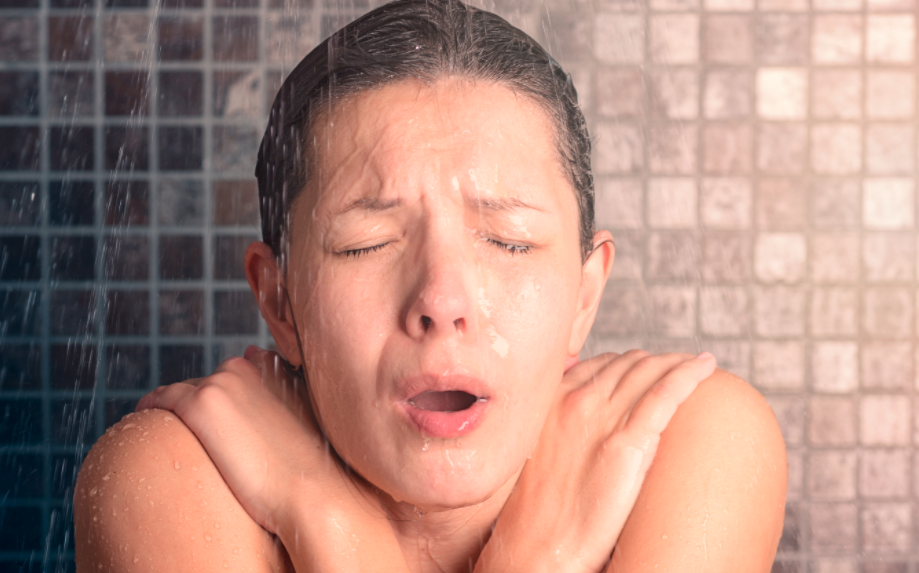Last Updated on April 23, 2023 by admin
If you have anxiety, then you know the importance of self-care to soothe your frayed, worried nerves. The last thing you would think to do is take a cold shower, as that sounds very uncomfortable. Yet cold shower therapy as a recommended modality for anxiety dates back to Ayurvedic times well over 5,000 years ago. Can a cold shower really help with your anxiety?
Cold showers used as hydrotherapy could alleviate anxiety, reducing heart rate and lessening depression according to the results of many studies. The cold temperatures can even increase your endorphins for a natural mood boost!
If you’re an anxiety sufferer looking for a holistic means of treatment that might help with your symptoms, we recommend you keep reading. Ahead, we’ll share some studies that reveal how a cold shower could relieve anxiety.
Understanding Anxiety
To explain how a cold shower can reduce anxiety symptoms, we first have to explain anxiety in full.
Everyone experiences anxiety to a degree, especially during a stressful situation like a big presentation or a speech. Yet for those with generalized anxiety disorder, their anxiety is more constant. Also, the symptoms may manifest not necessarily because of a stressful impending event, but for any reason and sometimes no reason at all.
Anxiety is a wide umbrella that encompasses many types, including separation anxiety, obsessive-compulsive disorder (OCD), panic disorder, social anxiety disorder, post-traumatic stress disorder (PTSD), and phobias.
A person may develop anxiety through behavioral decisions, a preexisting medical condition, environmental factors, genetics, or comorbidities. The worry and stress you experience with anxiety puts you at a higher risk of developing diabetes, high blood pressure, heart disease, obesity, and other cardiovascular disorders.
Treatment for anxiety may include medications like beta-blockers, benzodiazepines, buspirone, and antidepressants. Therapies such as dialectical behavioral therapy, prolonged exposure therapy, or cognitive behavioral therapy can also aide in one’s management of anxiety.
Can Cold Showers Help with Anxiety?
Some people with anxiety, especially more mild symptoms, also use alternative therapies like yoga and stress management. Cold showers as a form of hydrotherapy are another emerging option.
If your heart often goes into overdrive when your anxiety kicks into high gear, a cold shower may be able to help. According to a 2014 edition of the North American Journal of Medical Sciences, immersion in cold water, such as taking a bath, can reduce your heart rate by an impressive 15 percent. This could be enough to calm you down and help an anxiety attack pass faster.
If you have depression with your anxiety, a cold shower is also a good idea. This 2008 Medical Hypotheses report studied the effects of adaptive showers on depression symptoms. Adaptive showers are those that start warm or hot and get colder towards the end.
In this instance, the participants spent up to 3 minutes in 68-degree Fahrenheit water before taking 5 minutes of adaptation time. They showered like this up to twice every day over a few months.
The researchers found that when exposed to cold, the skin’s cold receptors come to life, activating the brain’s peripheral nerve endings and sending lots of electric impulses there. Further, noradrenaline and beta-endorphin blood levels both increase.
Noradrenaline is a central nervous system and peripheral transmitter that can produce feelings of euphoria. Beta-endorphins are peptide and neuropeptide hormones that suppress pain. The combination of the two leaves you feeling pain-free and happy, which puts you in a pretty good state for less anxiety.
Stress can often make anxiety symptoms worse. In a classic study in the European Journal of Applied Physiology, the researchers examined whether cold-pressure water immersion could affect areas of blood pressure, heart rate, and metabolic rate. The researchers also studied the cortisol levels of the participants. If you’re not familiar, cortisol is a main stress hormone.
All participants were young men. First, they were exposed to water that was 89.6 degrees, then 68 degrees, and then 57.2 degrees. As the water temperature went down, so too did the plasma cortisol concentrations of the participants.
In other words, then men’s stress levels were lower and lower with the temperature of their baths. Now, this study does involve water immersion instead of showering, so maybe taking a cold bath would be more beneficial than a shower. Even still, this is yet another perk of cold water for anxiety.
How Many Cold Showers a Week Should You Take?
If you’d like to try hydrotherapy as a holistic method for reducing your anxiety, you’re free to shower in cold water every single day if you can. If not, then doing so two to three times a week for a minute or several minutes at a time should be sufficient to control your heart rate and stress levels and to induce endorphins.
It’s not necessarily easy to shower in very cold water, so make sure you’re not worsening your anxiety through the experience. If you find yourself getting nervous or upset at the prospect of a cold shower, then this might not be the right holistic measure for you at this time.
Also, we do want to mention that cold showers should never replace your current anxiety treatment, be that medication, therapy, or a combination. Hydrotherapy can help, and for mild anxiety, it may be enough on its own, but not for more severe anxiety.
Conclusion
Anxiety can lead to a high heart rate, excess stress, depression, and other mood changes. Cold showers or hydrotherapy can alleviate these areas of anxiety, which can also help lessen your anxiety symptoms. Make sure you gradually acclimate to the change in water temperature and you’ll be ready to begin taking cold showers more often!
Don’t miss:
How Cold Does a Cold Shower Need to Be?
How to Take a Cold Shower Without Freezing
Are Cold Showers Good for You?
Is It Good to Have Cold Showers Every Day?
How Long Should a Cold Shower Last?
Do Cold Showers Boost Metabolism?
Recent Posts
You’ve read this blog and it’s certainly piqued your curiosity about what it means to be an SOS-free vegan. You’ve learned about this branch of veganism from our introductory post and maybe...
Vegans Desserts! Few things taste better than a refreshing ice cream cone on a hot summer’s day. Now that you’ve given up sugar and oil (not to mention salt) and gone vegan though, you may feel...

